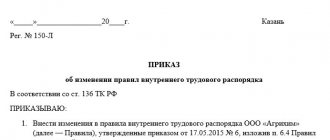Does an employee have to go to work if the employer fails to pay wages? If there is a possibility of absenteeism, what procedures must be followed to avoid negative consequences for the employee? Will the court collect wages from the employer for the period when the employee was absent from work?
Despite all the obviousness of the issues relating to an employee’s absence from work in the event of non-payment of wages, in practice everything does not look so clear.
To answer the above questions you need to do the following:
- Analyze the current Russian legislation in the field of labor relations regarding the possibility of an employee suspending work due to delayed wages.
- Determine the employer’s possible response steps to protect its interests in the event of an employee’s absence from work and the possible consequences for the employee.
- Study judicial practice on disputes between an employer and an employee as a result of the employee’s suspension of his work.
- Determine the list and sequence of actions of the employee in connection with the delay of wages, which must be carried out to eliminate negative consequences for the employee.
The employee’s right to suspend his work as provided for by law
According to the current Labor Code of the Russian Federation, the state guarantees the employee compliance with his labor rights and freedoms, certain working conditions, and protection in case of violation of the employee’s rights by the employer.









